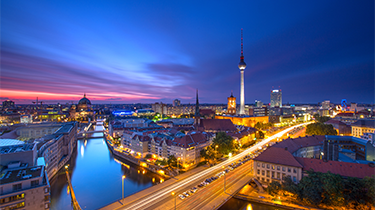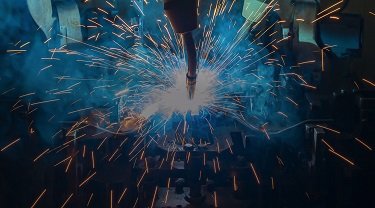

MyEDC account
Manage your finance and insurance services. Get access to export tools and expert insights.
Solutions
By product
By product
By product
By product
Insurance
Get short-term coverage for occasional exports
Maintain ongoing coverage for active exporters

Learn how credit insurance safeguards your business and opens doors to new markets.

See how portfolio credit insurance helped this Canadian innovator expand.
Guarantees
Increase borrowing power for exports
Free up cash tied to contracts
Protect profits from exchange risk
Unlock more working capital

Find out how access to working capital fueled their expansion.
Loans
Secure a loan for global expansion
Get financing for international customers
Access funding for capital-intensive projects

Find out how direct lending helped this snack brand go global.

Learn how a Canadian tech firm turns sustainability into global opportunity.
Investments
Get equity capital for strategic growth

Explore how GoBolt built a greener logistics network across borders.
By industry
Featured

See how Canadian cleantech firms are advancing global sustainability goals.

Build relationships with global buyers to help grow your international business.
Resources
Popular topics
Explore strategies to enter new markets
Understand trade tariffs and how to manage their impact
Learn ways to protect your business from uncertainty
Build stronger supply chains for reliable operation
Access tools and insights for agri-food exporters
Find market intelligence for mining and metals exporters
Get insights to drive sustainable innovation
Explore resources for infrastructure growth
Export stage
Discover practical tools for first-time exporters
Unlock strategies to manage risk and boost growth
Leverage insights and connections to scale worldwide

Learn how pricing strategies help you enter new markets, manage risk and attract customers.

Get expert insights and the latest economic trends to help guide your export strategy.
Trade intelligence
Track trade trends in Indo-Pacific
Uncover European market opportunities
Access insights on U.S. trade
Browse countries and markets
Get expert analysis on markets and trends
Discover stories shaping global trade
See what’s ahead for the world economy
Monitor shifting global market risks
Read exporters’ perspectives on global trade
Knowledge centre
Get answers to your export questions
Research foreign companies before doing business
Find trusted freight forwarders
Gain export skills with online courses
Get insights and practical advice from leading experts
Listen to global trade stories
Learn how exporters are thriving worldwide
Explore export challenges and EDC solutions
Discover resources for smarter exporting
About
Discover our story
See how we help exporters
Explore the companies we serve
Learn about our commitment to ESG
Understand our governance framework
See the results of our commitments
MyEDC account
Manage your finance and insurance services. Get access to export tools and expert insights.

Just over a year ago, a healthy, viable trade relationship with France was anything but certain. There were two candidates remaining in the running for President; one promoted France leaving the European Union (EU) and the other believed in promoting further alliances and trade agreements.
Since France is Canada’s fourth largest European trading partner and ninth global trading partner, the outcome would have a significant impact on Canada and its investors.
On May 7th, 2017, Emmanuel Macron won the election. It wasn’t just a win for business in France. It was a win for Canada as well.
Prior to Macron’s victory, when it came to foreign investment, France had a reputation as a country layered in bureaucracy with high taxes and a labour code that discouraged business. With the pro-business President in power, this is no longer the case.
Without wasting any time, the “Macron effect” has taken root and the economy is growing. Investors in Canada and around the world are optimistic and excited to do business in France.
Derived from an old French proverb, Reculer Pour Mieux Sauter means to literally draw back in order to leap forward. It applies directly to how Macron has changed the landscape and rebranded France as a business-friendly country.
By implementing aggressive labour reforms, Macron took an inflexible labour force and turned it into an attractive market for business and foreign investment. There are currently 200 subsidiaries of Canadian companies employing 16,000 people in France and foreign investment projects have hit a 10-year high.
Foreign direct investment went from $35.4 billion in 2016 to $51 billion in 2017 – an increase of close to 44%.
Macron also slashed corporate taxes, and then set his sights on young French graduates, challenging them to start their own businesses.
And, since Macron’s presidency started, start-ups have spiked in the country and continue to grow at a double-digit pace.
Since the Macron win, trade growth between Canada and France has increased slightly, by 1.5%. While that’s not a significant increase, there are more Canadian business opportunities in France than there were a year ago, and the future is promising.
While Macron’s presidency has created a trade buzz in France that wasn’t there a year ago, the Comprehensive Economic and Trade Agreement (CETA) also played a major role in bringing trade relations to a new level.
A Macron-led France was a critical component in the EU signing CETA with Canada. Since it was signed and provisionally applied on September 21, 2017, 98% of EU tariffs are now duty-free for Canada.
There are other positive outcomes as well; customs procedures are simpler and the testing and certification of products for EU markets can now be done in Canada, reducing costs for Canadian businesses exporting to the EU, and Canada now has access to EU public contracts at all levels. On top of that, it’s now easier for some professionals to work temporarily in the EU. All of these factors result in greater stability and protection on investments.
As far as new opportunities for Canadian businesses, investors can take advantage of anticipated growth in Cleantech, renewable energy, and utilities and pharmaceuticals industries.
France currently has a low number of exporting companies; but, they’re growing thanks to some of the reforms introduced by Macron. And, since France isn’t known for its focus on product modernization, Canadian companies can benefit by exporting their innovative products to a market where these products may not exist locally.
Protectionism is another form of risk investors face and Canada is certainly aware of its perils, thanks to the tariffs levied against steel and aluminum by U.S. President Donald Trump.
Having just won the FIFA World Cup and with the Tour de France in full swing – there’s no better time for France to declare they’re open for business. The world is watching. So are Canadians. Argon 18, a Canadian company is currently on display in France.
Founded in Montreal by retired cyclist Gervais Rioux, Argon 18 bikes are distributed in over 50 countries and are currently being used as the bike of choice for Kazakhstan’s Astana Pro Team at the Tour de France and Canada’s national road, track and para-cycling teams.
In just his first year as President, and with four years remaining, Macron is doing exactly as he pledged – his reforms are changing the way business is conducted both at home and internationally. Investor confidence is growing and France is once again open for business.
Countries that share free trade agreements (FTAs) with Canada often make ideal new markets. Learn the basics of FTAs and how they can benefit your business.

Learn about key sectors, market trends, and how EDC supports Canadian businesses expanding to Europe.

An EDC economist helps you understand the different country risks at play.

With EDC’s support, this chemical analysis and measurement company has taken on international contracts from all over the world.

See how the heavily integrated supply chain between the Canada-U.S. automotive industries benefit both sides of the border.

“Keep calm and trade on” appears to be the motto for these Canadian companies, as they reveal their strategies for dealing in the U.S. market.